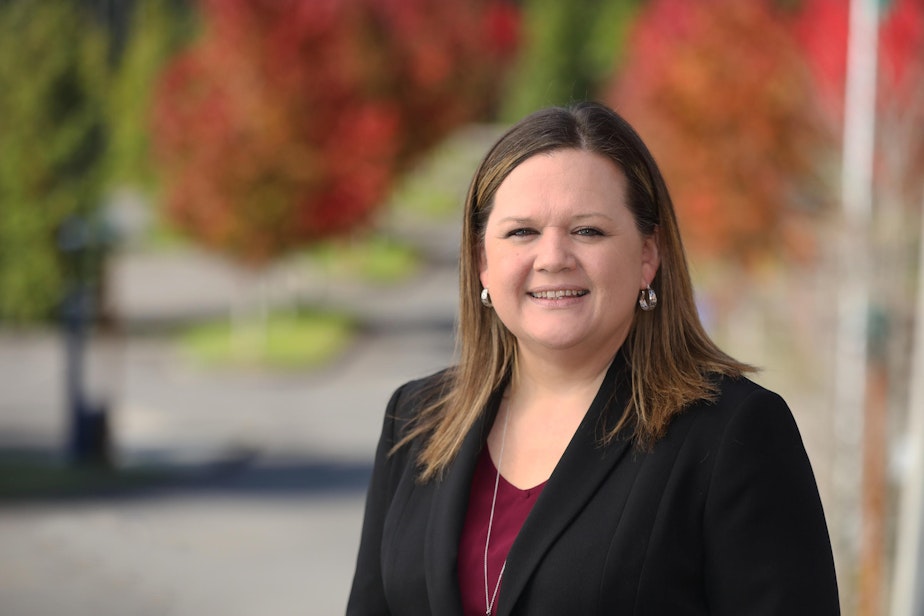Former inmate-turned-attorney to run for open statehouse seat

A Washington attorney and criminal justice reform advocate who previously served time in prison is seeking to become the first formerly incarcerated person elected to the Washington Legislature, at least in modern times.
Tarra Simmons, of Bremerton, who in 2017 won a Supreme Court fight to sit for the state bar exam, despite her prior criminal conviction, plans to formally announce her candidacy for the state House on Monday.
"I'd like to break this concrete ceiling," Simmons said in an exclusive interview with the public radio Northwest News Network. "I think we would all fare better if we have diverse people with lived experiences running for all kinds of offices."
Simmons will run in 2020 as a Democrat for an open House seat in the 23rd Legislative District, which includes parts of the Kitsap Peninsula and Bainbridge Island. She is the first candidate to announce for the position.
The seat is currently held by state Rep. Sherry Appleton, an eight-term Democrat who recently announced she will retire at the end of her current two-year term in January 2021. Appleton recruited Simmons to run for her seat and has endorsed Simmons' candidacy.
"I have been mentoring her all along," Appleton said. "I think she really is a very dynamic person...and she has a lot to offer in criminal justice reform and health care. I think she's the perfect person to run in my place."
In recent years, Simmons has emerged as a leading advocate in Washington for what she calls a "second chance" for people who've been involved in the criminal justice system. She noted that nearly 1 in 3 Americans have some sort of criminal record.
Simmons co-chairs Washington's Statewide Reentry Council and serves on a new sentencing reform task force. During the 2019 legislative session, she played a key role in the bipartisan passage of the New Hope Act, which creates a process by which people can petition to have their criminal convictions vacated.
Simmons, who is director of the Civil Survival Project at the Public Defender Association in Seattle, said she has enjoyed working with the Legislature, but had no plans to run for public office in part because of her past conviction.
"I never felt like it was something I wanted to put myself or my family through based on my background," Simmons said.
But that started to change last year, Simmons said, when her case became fodder in a state Senate campaign. Republicans sent a mailer to voters accusing the Democratic candidate in that race, Emily Randall, who ultimately won, of supporting Simmons. The mailer described Simmons as a "drug addicted ex-con."
Simmons said the support she received in the wake of that incident gave her confidence that she and her family could withstand political attacks about her background.
"I saw in that moment how the community and elected officials really pushed back against that," Simmons said.
In 2011, Simmons was sentenced to 20 months in prison following an arrest for delivery of Oxycodone, possession of marijuana with intent to deliver and unlawful possession of a firearm. Simmons, who at the time was working as a registered nurse, said she started using drugs following the death of her father in 2010. To support her habit, Simmons said, she resorted to stealing and selling drugs.
After her release from prison, during which time she went through a drug treatment program, Simmons was admitted to Seattle University School of Law and graduated magna cum laude in 2017. But when she applied to sit for the bar exam, the Washington State Bar Association voted 6-to-3 against admitting her.
With the help of another convicted-felon-turned-lawyer, Shon Hopwood, who served time for bank robbery and now teaches at Georgetown Law, Simmons successfully challenged that decision before the Washington Supreme Court.
She took the bar exam in February 2018 and was sworn in as an attorney in June of that year. Simmons' battle to become a licensed lawyer garnered local and national media attention. In 2018, she was profiled by NPR's Invisibilia program.
While rare, it's not unprecedented for formerly incarcerated people to run for public office. Last year, Lewis Conway Jr., who was convicted of manslaughter in 1993, ran unsuccessfully for the city council in Austin. However, his candidacy triggered a debate in Texas over whether people with past felony convictions could run for office.
This year, Brent Coles, the former mayor of Boise who pleaded guilty in a corruption scandal in 2003, is once again running for mayor of Idaho's capital. According to the Washington Secretary of State's office, a felony conviction does not disqualify someone from running for public office, so long as they're no longer under DOC custody and are registered to vote.
Simmons said she's received an order of discharge from the courts for her convictions and all of her civil rights have been restored, including her right to vote.
The National Conference of State Legislatures said it doesn't track the candidacies or election of formerly incarcerated people to legislative office. However, Simmons said she could not find any examples of current state legislators in the United States who had previous felony convictions or had served time in prison.
If ultimately elected, Simmons said she would bring the Legislature her "lived experiences" of having been in foster care as a child, experiencing homelessness, becoming a teen mom and being part of the criminal justice system.
In additional to criminal justice issues, she said she would focus on education and access to health care, including drug treatment and mental health services. "I know that I don't have the typical biography of a politician," Simmons said. "I just think that everybody needs a first chance to begin with and a second chance when needed."
Stay in the know by subscribing to KUOW's Election Newsletter. Each week, we'll send you updates on stories to watch and news not to miss. Sign up at kuow.org/elections.




